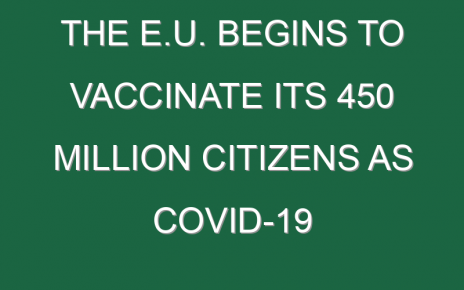Israel is likely to severely tighten its coronavirus lockdown, despite a relatively successful vaccination program that may soon get a timely boost from drugmaker Moderna.
The move, expected to be confirmed Tuesday afternoon, underscores the fact that—at least at this early stage—even the fastest inoculation program cannot stop the pandemic on its own.
Israel, which has a population of around 9 million, began its vaccination drive on Dec. 20. So far, it has managed to vaccinate more than 1.37 million of its people—a world-beating proportion, though it should be noted that Palestinians in Israeli-occupied West Bank and Gaza are being left out for now, with Israeli officials claiming the rollout in those territories is the responsibility of the Palestinians themselves.
The country’s vaccine program has been so successful that it’s running low on the two-dose Pfizer-BioNTech shots that have fueled the drive thus far.
Health officials recently warned it will be necessary to take a two-week pause in the deployment of initial jabs, so as to have enough second doses to cover elderly and particularly vulnerable parts of the population that have already received the first. Although some countries such as the U.K. are heavily spacing out the two shots of the Pfizer-BioNTech regimen in order to cover as much of their populations as possible, both of those companies have warned that doing so could reduce the vaccine’s efficacy.
Moderna to the rescue?
On Monday, however, the Israeli health ministry authorized the importation of Moderna’s vaccine—a move that should help ease Israel’s supply problem.
Moderna responded by saying the ministry had secured 6 million of its doses, and the first deliveries were “expected to begin in January.” Chezy Levy, director-general of the Israeli health ministry, also said Moderna’s first vaccines would arrive in around two weeks’ time.
But the timeline was news to Israeli Health Minister Yuli Edelstein, who told reporters Tuesday that he still expected deliveries to commence in March, as previously assumed. “We don’t know anything about moving up [the delivery] of the Moderna vaccines. Unfortunately only in two months will we see the shipments,” Edelstein said. (Moderna had not responded to a request for comment at the time of publication.)
So, despite Moderna’s announcement, Edelstein is backing a tighter lockdown in Israel that would see nonessential workplaces and schools shuttered for two weeks.
Despite the successful start to the country’s vaccine rollout, the country on Monday recorded 8,311 new infections, which is one of its worst daily totals yet, representing positive results for 7.4% of those screened.
“We want to build a bridge between today, between the current rate of infection and the success of vaccines,” Edelstein said. “We can only build this bridge on one condition: a complete closure.”
Edelstein did not however respond to a Times of Israel report that alleged hundreds of Prime Minister Benjamin Netanyahu’s staffers—even some who work from home—got vaccines early, regardless of their age or pre-existing medical conditions.
More health care and Big Pharma coverage from Fortune:
- The biggest conspiracy theories of 2020 (and why they won’t die)
- Timeline: From the first coronavirus cases to the first vaccinations
- Trump hyped Verily’s coronavirus testing tool. It led to less than 1% of all tests in 2020
- Commentary: Cracking the code of biological aging could solve America’s health care crisis
- Data delays aren’t slowing the global rollout of a Chinese COVID-19 vaccine




